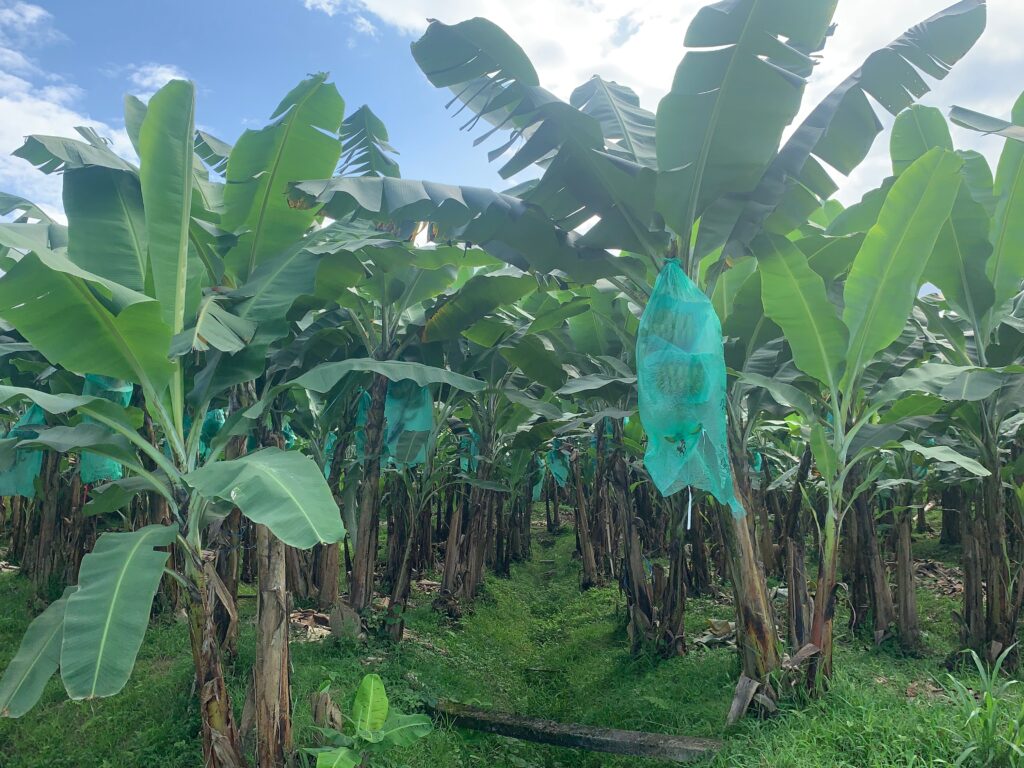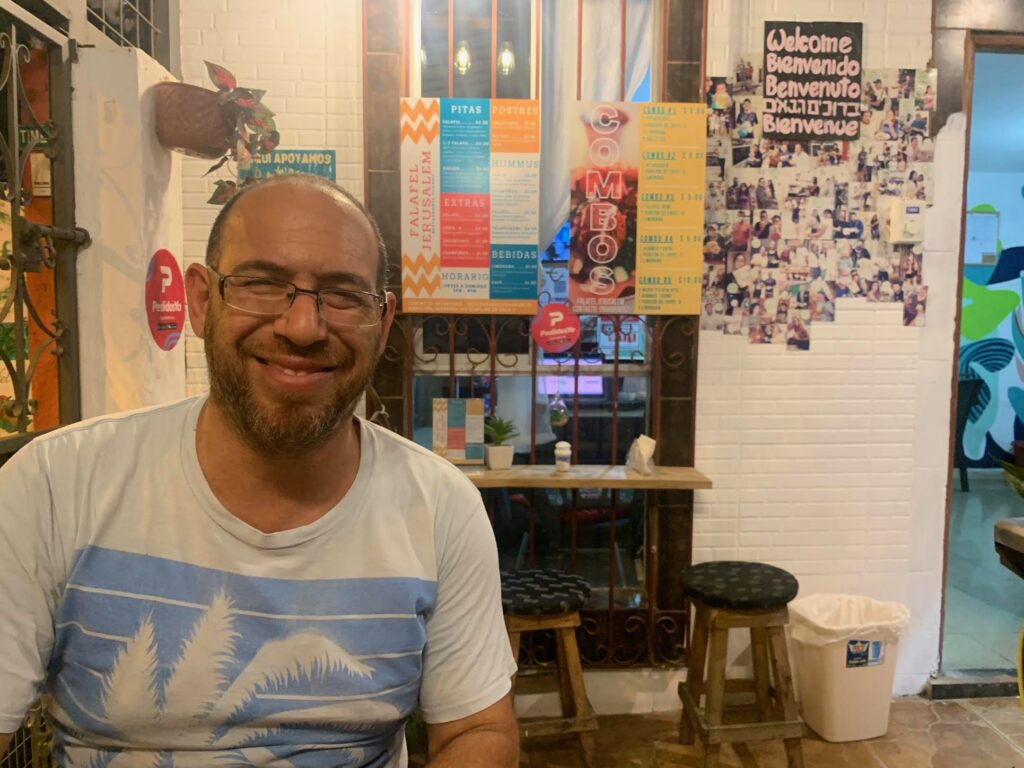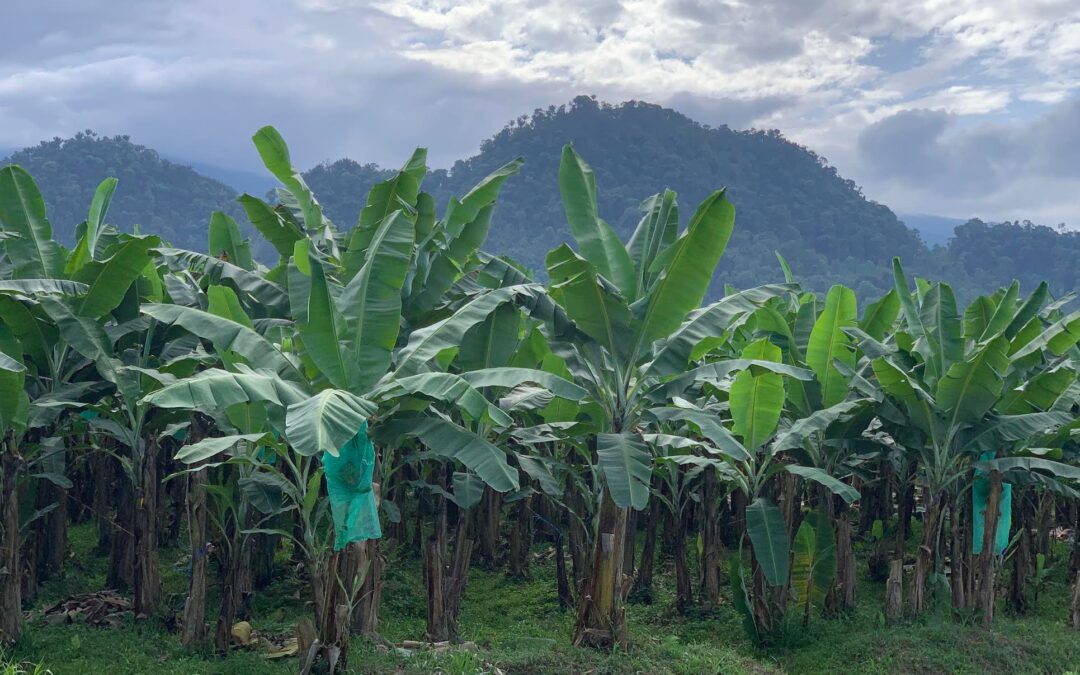January 23rd 2013, Machala, Ecuador
Crossing from Peru into Ecuador proved to be a frustrating experience. When one enters the frontier complex, which is run jointly by both countries, the first building is the Peruvian customs operation. You queue up at a black glass hatch which opens and shuts every now and then with a grumpy swish as a hand inside returns a document or demands the production of another from the hapless person on the outside. When my turn comes, I hand in everything — passport, driving licence, bike registration documents and the previously issued Peruvian customs permission to have the bike in the country. Swoosh! the hatch opens again and the person inside demands to see my exit Peru passport stamp, which I don’t yet have because, well, this is the first building in the complex and so, this is where I came first. Apparently, I should have gone further into the complex to the third building, got my exit from Peru passport stamp there, and then returned to this building, the first building, and dealt with the customs end of things, because I would by then have left the country.
Simple? Yes. Obvious? No.
A kindly woman, another traveller, assists me and shows me where the passport stamp could be obtained — at a row of other hatches where “exiting Peru” sits beside “entering Ecuador” and one moves from one to the other in logical sequence. At other border posts I have passed through in Latin America, this method, largely fool proof and failsafe, is how the customs also operate. But not here.
After getting my “exit-and-entry” passport stamp showing I had left Peru and entered Ecuador, I returned to Peru (technically) for the Peruvian customs bloke to do his bit, which he did, and the kindly lady once again showed me the other building where an Ecuadoran customs person would, hopefully, let me and the bike into Ecuador and we could be on our way.
An Ecuadoran customs officer, wearing military camo clothes for some reason, managed to squeeze me in between viewing YouTube clips on his phone that had his almost undivided attention. He wants to see the bike’s registration paper, which I give him, my passport, which I give him, and my driver’s licence, which I also give him. Suddenly, I have an ice cold feeling that he’s going to ask to see my insurance, which I do not have, my Argentine policy having lapsed at the frontier. Thankfully, he doesn’t and, when I notice a biker sticker on his desktop, a present evidently from an earlier biker, I whip out my own stickers and make the presentation. He’s delighted, triple stamps everything that has to be triple stamped, hands me my papers and send me on my way.

Banana plantation with ripening fruit sheathed in plastic bag for extra heat.
The first thing that strikes me while riding through southern Ecuador is how clean the place is, my comparison to Peru. There isn’t a speck of litter anywhere. In fact, there are public employees out picking up litter. Then there’s the notices: don’t drop litter, they say, don’t throw litter from your car window, says another. There’s also a sign along the roadside, a small sign maybe a half meter square, no more, that says, very simply, plant a tree. The sign has a photograph of large male hands, cupped together protecting a seedling that has just sprouted. A variation of this image occurs a little further on with the adult hands handing the seedling to a pair of child’s hands. The overall message is clear: Ecuador cares about the environment, or at least has a strong public message out there to that effect. Later, I read that in 2008 Ecuador became the first country in the world to enshrine in its constitution a legally enforceable “rights of nature” — a concept similar to the notion of human rights. In other words, nature and ecosystems have a right to exist, according to the Ecuadoran constitution, and must be respected and maintained so that life cycles are regenerated, and nature can function properly and evolve accordingly. The contrast with Peru could hardly be greater. Much of this was driven by a left wing president, Rafael Correa, who was in office for 10 years from 2007. I suppose some of it has to be linked also to the fact that the Galapagos Islands are part of Ecuador and so there is an enhanced appreciation of such matters. In any event, what one sees is such a pleasant change from poor, godforsaken, litter and filth-chocked Peru.
Another thing that strikes is the number of banana plantations. They’re everywhere — literally everywhere. I would say that for most of 100 kilometres journey north from the border, banana plantations dominated the landscape. They’re not unpleasant but they are repetitive and I don’t think nature thrives in monoculture.
I arrived in Machala and checked into the first hotel I saw. This was a mistake because, with its concrete walls and steel doors, it had all the charm of a prison but I was too hot and sticky to go on. In my bedroom, two huge curtains were pulled across one wall. When I opened them, they revealed not windows to the outside world but a solid concrete wall! Next day, I headed off to Guayaquil which I had no idea is by far the largest city in Ecuador, with a population of almost six million, city and metropolitan area combined. The capital Quito, further along my probable route, has a modest two million plus. I found what looked to be a really nice hostel, Casa Michael, which turned out to be more than usually interesting.

Michael of Casa Michael.
It was located in a knot of small streets with modest, single storey terraced homes, most of them built in the past 30 or 40 years, I would guess. Casa Michael is brightly painted in cheerful blues, greens and yellows. It has an shaded, inner courtyard garden with hammocks and a nice lazy, laidback feel to it. And there’s a small restaurant, the Jerusalem, specialising in falafel. It’s pretty obvious very quickly that Cass Michael has a strong Jewish/Israeli aspect to it: there are books in Hebrew and the TV, in front of which a young man sits watching what appears to be a fairly brainless soap of the Neighbours variety, has Hebrew sub-titles. Later, I get chatting to Michael who turns out to be just as interesting as his hostel.
He’s aged 45 and is indeed from Israel originally. His life path was initially fairly conventional — school, college, military service and then computing at which he was a successful software engineer. “I guess I was living the life that most Israelis aspire to,” he said, adding that he was newly married in his late 20s, living in Tel Avia and with a future all laid out ahead of him. But then he went to Nepal, with his father, and climbed mountains, and something awakened inside him. He began vegetarian and, when he came home to Israel, decided he wanted to alter his life radically. He separated from his wife and went to live in India for six months as a backpacker. Back home again, he told his employer that he’d stay for a time but would be leaving. He worked and saved and, after two years, went to South America — to Peru, to Machu Picchu and to the Galapagos., He spent a year living on Colombia’s Pacific coast (to which not many people travel); he came to Ecuador and spent several months living in Montañita learning how to surf properly.
And then he met his new wife, who is Ecuadoran, “and then we had to do something for a living”, as he puts it. She already had a hostel in Guayaquil and so they decided to get into the hostel business in a more serious way. . . and Casa Michael was born eight years ago. “I traded this for all the freedom I had,” he says, though not entirely seriously, I think. He’s a happy man with two children, a boy aged nine and a girl aged four, but I sense another move will come about. . .
The falafel is fantastic — a pitta stuffed fat with fresh falafel and salad, and lemon juice and two sweet homemade biscuits . . . all for $5. That’s another strange thing about Ecuador: they’ve given up on the idea of their own currency and use the US dollar instead, absolutely everywhere. There simply is no Ecuadoran money any more.
Michael is full of advice about the Galapagos Islands, having spent a lot of time there, diving and snorkelling. He has me convinced. . .
